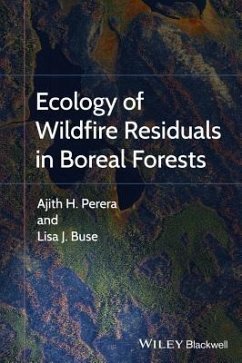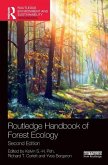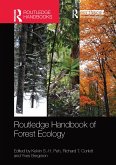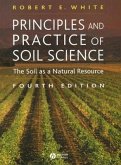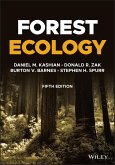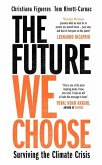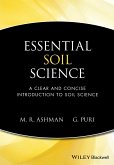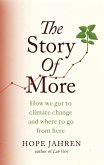- Gebundenes Buch
- Merkliste
- Auf die Merkliste
- Bewerten Bewerten
- Teilen
- Produkt teilen
- Produkterinnerung
- Produkterinnerung
Helps you explore ecological patterns and processes of what does not burn within boreal wildfires. Following a brief introduction to the boreal forest biome, this book discusses the processes that form wildfire residuals; how they are studied, with various approaches and methods; and types, extent, and ecological functions of wildfire residuals.
Andere Kunden interessierten sich auch für
![Routledge Handbook of Forest Ecology Routledge Handbook of Forest Ecology]() Routledge Handbook of Forest Ecology253,99 €
Routledge Handbook of Forest Ecology253,99 €![Routledge Handbook of Forest Ecology Routledge Handbook of Forest Ecology]() Routledge Handbook of Forest Ecology88,99 €
Routledge Handbook of Forest Ecology88,99 €![Principles and Practice of Soil Science Principles and Practice of Soil Science]() Robert E. White (University of Melbourne Australia)Principles and Practice of Soil Science75,99 €
Robert E. White (University of Melbourne Australia)Principles and Practice of Soil Science75,99 €![Forest Ecology Forest Ecology]() Daniel M. Kashian (USA Wayne State University)Forest Ecology145,99 €
Daniel M. Kashian (USA Wayne State University)Forest Ecology145,99 €![The Future We Choose The Future We Choose]() Christiana FigueresThe Future We Choose20,99 €
Christiana FigueresThe Future We Choose20,99 €![Essential Soil Science Essential Soil Science]() Mark Ashman (Rothamsted Formerly at IACR)Essential Soil Science61,99 €
Mark Ashman (Rothamsted Formerly at IACR)Essential Soil Science61,99 €![The Story of More The Story of More]() Hope JahrenThe Story of More16,99 €
Hope JahrenThe Story of More16,99 €-
-
-
Helps you explore ecological patterns and processes of what does not burn within boreal wildfires. Following a brief introduction to the boreal forest biome, this book discusses the processes that form wildfire residuals; how they are studied, with various approaches and methods; and types, extent, and ecological functions of wildfire residuals.
Hinweis: Dieser Artikel kann nur an eine deutsche Lieferadresse ausgeliefert werden.
Hinweis: Dieser Artikel kann nur an eine deutsche Lieferadresse ausgeliefert werden.
Produktdetails
- Produktdetails
- Verlag: John Wiley and Sons Ltd
- Seitenzahl: 272
- Erscheinungstermin: 9. September 2014
- Englisch
- Abmessung: 236mm x 155mm x 20mm
- Gewicht: 600g
- ISBN-13: 9781444336535
- ISBN-10: 1444336533
- Artikelnr.: 40200914
- Herstellerkennzeichnung
- Libri GmbH
- Europaallee 1
- 36244 Bad Hersfeld
- gpsr@libri.de
- Verlag: John Wiley and Sons Ltd
- Seitenzahl: 272
- Erscheinungstermin: 9. September 2014
- Englisch
- Abmessung: 236mm x 155mm x 20mm
- Gewicht: 600g
- ISBN-13: 9781444336535
- ISBN-10: 1444336533
- Artikelnr.: 40200914
- Herstellerkennzeichnung
- Libri GmbH
- Europaallee 1
- 36244 Bad Hersfeld
- gpsr@libri.de
Ajith H. Perera is a senior research scientist and leads the Forest Landscape Ecology Program at the Ontario Forest Research Institute in Ontario, Canada. He has over twenty-five years of research experience in landscape ecology, much of it focused on understanding patterns and processes of boreal forest fire regimes. He has authored many scientific publications, including several books. Lisa J. Buse is a forest biologist who specializes in knowledge transfer at the Ontario Forest Research Institute. She has over twenty years of experience in communicating forestry sciences to practitioners, especially on forest landscape ecology including wildfire disturbances in boreal Ontario. She has also published many scientific publications and co-edited three books.
Acknowledgments xi
About the companion website xiii
1 Introduction 1
The boreal forest biome 2
Geographical distribution 4
Distinguishing features 6
Boreal wildfires 9
Major characteristics 9
Ecological significance 11
Goals and scope of the book 12
References 14
2 Formation of wildfire residuals 18
Factors that affect the formation of residuals 19
Boreal forest communities 20
Boreal wildfires 31
Residual formation and distribution 40
Spatial heterogeneity in fire behavior 41
Process of residual formation 44
Summary 59
References 61
3 Types of wildfire residuals and their extent 65
Types of wildfire residuals 66
A post-wildfire scene 66
Past descriptions of wildfire residuals 71
Abundance and extent of wildfire residuals 79
Snag residuals 80
Live tree residuals 81
Residual patches 84
Changes in residuals after wildfires 88
Snag residuals 88
Live tree residuals 89
Residual patches 92
Toward improved definitions and assessment 93
Reasons for improvement 93
Definitions of wildfire residuals 95
Improved study approaches 103
Summary 107
References 113
4 Ecological roles of wildfire residuals 119
Ecological processes involving snag residuals 121
Invasion by beetles 121
Colonization by woodpeckers 132
Occupation by other bird species 140
Forest regeneration 142
Roles of the residual patches 148
Providing temporary shelter 149
Supplementing the recovery 151
Creating heterogeneity 161
Ecological significance 161
Wildfire residuals and the carbon cycle 162
Wildfire residuals and nutrient and hydrological cycles 165
Summary 168
References 173
5 Role of wildfire residuals in forest management applications 184
Restoring wildfire residuals 185
Ecological expectations 186
Considerations for application 187
Challenges and uncertainties 190
Emulating wildfire disturbance 191
Background 191
Emulating wildfire residuals by forest harvest 193
Expectations and uncertainties 197
Salvage logging 202
Background 202
Ecological consequences 204
Practical considerations 212
Uncertainties 217
Summary 220
References 222
6 Ecology of boreal wildfire residuals - a summary and synthesis 227
Wildfire residuals and their occurrence 227
Residual vegetation types 228
Spatial patterns of residuals 231
Ecological roles of wildfire residuals 235
Snag residuals 235
Residual patches 236
A conceptual view 237
Knowledge uncertainties 239
Management applications and wildfire residuals 240
Salvage logging 240
Emulating wildfire disturbances 240
Restoring wildfire residuals 242
Suppressing fire 243
Research needs on wildfire residuals 243
Advancing research methods 243
Expanding research topics 244
Conclusion 245
Index 247
About the companion website xiii
1 Introduction 1
The boreal forest biome 2
Geographical distribution 4
Distinguishing features 6
Boreal wildfires 9
Major characteristics 9
Ecological significance 11
Goals and scope of the book 12
References 14
2 Formation of wildfire residuals 18
Factors that affect the formation of residuals 19
Boreal forest communities 20
Boreal wildfires 31
Residual formation and distribution 40
Spatial heterogeneity in fire behavior 41
Process of residual formation 44
Summary 59
References 61
3 Types of wildfire residuals and their extent 65
Types of wildfire residuals 66
A post-wildfire scene 66
Past descriptions of wildfire residuals 71
Abundance and extent of wildfire residuals 79
Snag residuals 80
Live tree residuals 81
Residual patches 84
Changes in residuals after wildfires 88
Snag residuals 88
Live tree residuals 89
Residual patches 92
Toward improved definitions and assessment 93
Reasons for improvement 93
Definitions of wildfire residuals 95
Improved study approaches 103
Summary 107
References 113
4 Ecological roles of wildfire residuals 119
Ecological processes involving snag residuals 121
Invasion by beetles 121
Colonization by woodpeckers 132
Occupation by other bird species 140
Forest regeneration 142
Roles of the residual patches 148
Providing temporary shelter 149
Supplementing the recovery 151
Creating heterogeneity 161
Ecological significance 161
Wildfire residuals and the carbon cycle 162
Wildfire residuals and nutrient and hydrological cycles 165
Summary 168
References 173
5 Role of wildfire residuals in forest management applications 184
Restoring wildfire residuals 185
Ecological expectations 186
Considerations for application 187
Challenges and uncertainties 190
Emulating wildfire disturbance 191
Background 191
Emulating wildfire residuals by forest harvest 193
Expectations and uncertainties 197
Salvage logging 202
Background 202
Ecological consequences 204
Practical considerations 212
Uncertainties 217
Summary 220
References 222
6 Ecology of boreal wildfire residuals - a summary and synthesis 227
Wildfire residuals and their occurrence 227
Residual vegetation types 228
Spatial patterns of residuals 231
Ecological roles of wildfire residuals 235
Snag residuals 235
Residual patches 236
A conceptual view 237
Knowledge uncertainties 239
Management applications and wildfire residuals 240
Salvage logging 240
Emulating wildfire disturbances 240
Restoring wildfire residuals 242
Suppressing fire 243
Research needs on wildfire residuals 243
Advancing research methods 243
Expanding research topics 244
Conclusion 245
Index 247
Acknowledgments xi
About the companion website xiii
1 Introduction 1
The boreal forest biome 2
Geographical distribution 4
Distinguishing features 6
Boreal wildfires 9
Major characteristics 9
Ecological significance 11
Goals and scope of the book 12
References 14
2 Formation of wildfire residuals 18
Factors that affect the formation of residuals 19
Boreal forest communities 20
Boreal wildfires 31
Residual formation and distribution 40
Spatial heterogeneity in fire behavior 41
Process of residual formation 44
Summary 59
References 61
3 Types of wildfire residuals and their extent 65
Types of wildfire residuals 66
A post-wildfire scene 66
Past descriptions of wildfire residuals 71
Abundance and extent of wildfire residuals 79
Snag residuals 80
Live tree residuals 81
Residual patches 84
Changes in residuals after wildfires 88
Snag residuals 88
Live tree residuals 89
Residual patches 92
Toward improved definitions and assessment 93
Reasons for improvement 93
Definitions of wildfire residuals 95
Improved study approaches 103
Summary 107
References 113
4 Ecological roles of wildfire residuals 119
Ecological processes involving snag residuals 121
Invasion by beetles 121
Colonization by woodpeckers 132
Occupation by other bird species 140
Forest regeneration 142
Roles of the residual patches 148
Providing temporary shelter 149
Supplementing the recovery 151
Creating heterogeneity 161
Ecological significance 161
Wildfire residuals and the carbon cycle 162
Wildfire residuals and nutrient and hydrological cycles 165
Summary 168
References 173
5 Role of wildfire residuals in forest management applications 184
Restoring wildfire residuals 185
Ecological expectations 186
Considerations for application 187
Challenges and uncertainties 190
Emulating wildfire disturbance 191
Background 191
Emulating wildfire residuals by forest harvest 193
Expectations and uncertainties 197
Salvage logging 202
Background 202
Ecological consequences 204
Practical considerations 212
Uncertainties 217
Summary 220
References 222
6 Ecology of boreal wildfire residuals - a summary and synthesis 227
Wildfire residuals and their occurrence 227
Residual vegetation types 228
Spatial patterns of residuals 231
Ecological roles of wildfire residuals 235
Snag residuals 235
Residual patches 236
A conceptual view 237
Knowledge uncertainties 239
Management applications and wildfire residuals 240
Salvage logging 240
Emulating wildfire disturbances 240
Restoring wildfire residuals 242
Suppressing fire 243
Research needs on wildfire residuals 243
Advancing research methods 243
Expanding research topics 244
Conclusion 245
Index 247
About the companion website xiii
1 Introduction 1
The boreal forest biome 2
Geographical distribution 4
Distinguishing features 6
Boreal wildfires 9
Major characteristics 9
Ecological significance 11
Goals and scope of the book 12
References 14
2 Formation of wildfire residuals 18
Factors that affect the formation of residuals 19
Boreal forest communities 20
Boreal wildfires 31
Residual formation and distribution 40
Spatial heterogeneity in fire behavior 41
Process of residual formation 44
Summary 59
References 61
3 Types of wildfire residuals and their extent 65
Types of wildfire residuals 66
A post-wildfire scene 66
Past descriptions of wildfire residuals 71
Abundance and extent of wildfire residuals 79
Snag residuals 80
Live tree residuals 81
Residual patches 84
Changes in residuals after wildfires 88
Snag residuals 88
Live tree residuals 89
Residual patches 92
Toward improved definitions and assessment 93
Reasons for improvement 93
Definitions of wildfire residuals 95
Improved study approaches 103
Summary 107
References 113
4 Ecological roles of wildfire residuals 119
Ecological processes involving snag residuals 121
Invasion by beetles 121
Colonization by woodpeckers 132
Occupation by other bird species 140
Forest regeneration 142
Roles of the residual patches 148
Providing temporary shelter 149
Supplementing the recovery 151
Creating heterogeneity 161
Ecological significance 161
Wildfire residuals and the carbon cycle 162
Wildfire residuals and nutrient and hydrological cycles 165
Summary 168
References 173
5 Role of wildfire residuals in forest management applications 184
Restoring wildfire residuals 185
Ecological expectations 186
Considerations for application 187
Challenges and uncertainties 190
Emulating wildfire disturbance 191
Background 191
Emulating wildfire residuals by forest harvest 193
Expectations and uncertainties 197
Salvage logging 202
Background 202
Ecological consequences 204
Practical considerations 212
Uncertainties 217
Summary 220
References 222
6 Ecology of boreal wildfire residuals - a summary and synthesis 227
Wildfire residuals and their occurrence 227
Residual vegetation types 228
Spatial patterns of residuals 231
Ecological roles of wildfire residuals 235
Snag residuals 235
Residual patches 236
A conceptual view 237
Knowledge uncertainties 239
Management applications and wildfire residuals 240
Salvage logging 240
Emulating wildfire disturbances 240
Restoring wildfire residuals 242
Suppressing fire 243
Research needs on wildfire residuals 243
Advancing research methods 243
Expanding research topics 244
Conclusion 245
Index 247

